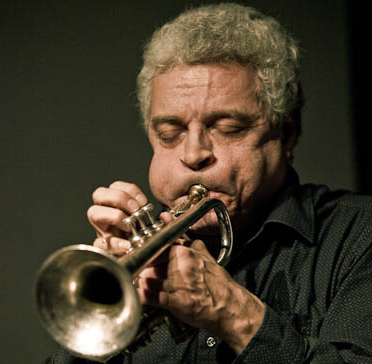Jan 13, 2026 2:09 PM
More Trump-Kennedy Center Cancellations
The fallout from the renaming of the John F. Kennedy Center for the Performing Arts to include President Donald…

Robertson had a penetrating, pliant sound with a remarkable softness at its center.
(Photo: Courtesy herbrobertson.com)Herb Robertson, a trumpeter and flugelhornist known for his wide-lens explorations of the avant-garde, died Dec. 10. He was 73.
His death was announced on Facebook by his brother, Keith Robertson. Location and cause of death were not disclosed; Keith Robertson described his brother’s death as “sudden.”
Robertson had a penetrating, pliant sound that was often determined to explore as many of its sonic possibilities as it could attain. Yet there was also a remarkable softness at its center, with Robertson as capable of lyricism as of experimentalism. His collaborators ranged from Tim Berne, Andy Laster and Mark Helias to Bill Frisell, Brian Lynch and David Sanborn. In any of those contexts, however, Robertson brought a remarkable and assured sense of swing.
“Herb was my mentor and musical sidekick for many years in the ’80s and ’90s,” Berne wrote on Facebook. “Every night was like a feature film full of astounding moments of beautifully inspired insanity.”
Other musicians added their own warm tributes. “He had a heart of pure gold,” wrote pianist Michael Jefry Stevens.
“The best guy,” added guitarist Joe Morris. “Tremendous musician and artist.”
Clarence Clifford Robertson was born Feb. 21, 1951, in Piscataway, New Jersey. He began playing trumpet in his elementary school band in the fifth grade; two years later, in junior high school, his teacher introduced him to jazz. By the time of his high school graduation in 1969, he had become a fervent jazz fan and collector, and matriculated at Berklee College of Music — though he left without a degree in 1973 to tour with jazz-rock bands.
Robertson met Tim Berne in the late ’70s back in his native New Jersey. They became frequent creative partners, each appearing regularly on the other’s gigs and recordings throughout the next two decades and even occasionally into the 2000s. These outings led to Robertson being celebrated as a shrewd free improviser, yet also a lyrical and thoughtful one. (Robertson had damaged his embouchure from the hard blowing of his jazz-rock period; he reinvented his style with a softer attack.)
Robertson made his first album as a leader, Transparency, in 1985, and in the ensuing four decades he appeared on more than 100 recordings that ranged from duo (e.g., Tuesday Prayers, a 2014 collaboration with Danish guitarist Mark Solborg) to big band (e.g., several records with Japanese pianist Satoko Fujii’s Orchestra New York, including 2019’s Entity). He remained throughout these projects a steadfast explorer of the timbres at his disposal, frequently experimenting with different mutes and horn blends. Hommage A Galina Ustvolskaya, a March 2024 session led by trombonist Steve Swell — and featuring bassoonist Sara Schoenbeck and tubist Ben Stapp in addition to Swell and Robertson — may have been his final recording. DB

Belá Fleck during an interview with Fredrika Whitfield on CNN.
Jan 13, 2026 2:09 PM
The fallout from the renaming of the John F. Kennedy Center for the Performing Arts to include President Donald…

Peplowski first came to prominence in legacy swing bands, including the final iteration of the Benny Goodman Orchestra, before beginning a solo career in the late 1980s.
Feb 3, 2026 12:10 AM
Ken Peplowski, a clarinetist and tenor saxophonist who straddled the worlds of traditional and modern jazz, died Feb. 2…

The success of Oregon’s first album, 1971’s Music Of Another Present Era, allowed Towner to establish a solo career.
Jan 19, 2026 5:02 PM
Ralph Towner, a guitarist and composer who blended multiple genres, including jazz — and throughout them all remained…

Rico’s Anti-Microbial Instrument Swab
Jan 19, 2026 2:48 PM
With this year’s NAMM Show right around the corner, we can look forward to plenty of new and innovative instruments…

Richie Beirach was particularly renowned for his approach to chromatic harmony, which he used to improvise reharmonizations of originals and standards.
Jan 27, 2026 11:19 AM
Richie Beirach, a pianist and composer who channeled a knowledge of modern classical music into his jazz practice,…